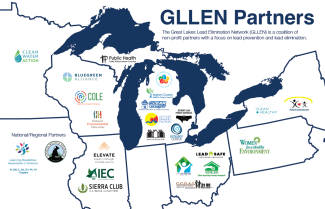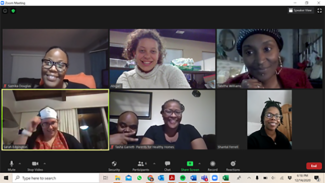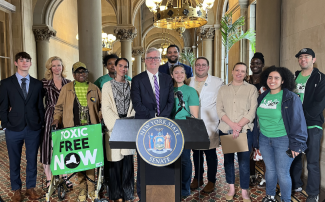A Regional Network

Since 2019, the Great Lakes Lead Elimination Network (GLLEN), with leadership by the Ecology Center, has come together to prevent lead poisoning in children in the Great Lakes region. Our joined efforts have resulted in collaboration across eight states with over 30 organizations, including five new parent-led organizations.
GLLEN works to eliminate lead hazards in homes, schools, work places, and other areas. We coordinate our efforts to engage with decision-makers regarding local and state-level policy. We share resources in order to educate the public about how to avoid lead.

Lead in the Great Lakes States
GLLEN considers all US states bordering the Great Lakes to be part of the Great Lakes region, including Illinois, Indiana, Michigan, Minnesota, New York, Ohio, Wisconsin, and Pennsylvania. The Great Lakes region is home to America’s industrial heartland. For hundreds of years, goods and the parts to make them have been transported up and down the connected waterways. The area’s industry and workers served as the arsenal of democracy during World War II. But with that honor comes industrial pollution that is both historical and on-going. We boast some of the first paved roads in the country. This also means we have lead in our soil from cars and leaded gasoline. Our major cities were hubs of activity and elegance, and feature 100-year-old architecture. But this also means that most of our houses were built before 1978 and have leaded paint. It means that lead may also be a concern in schools, apartment buildings, municipal buildings, and more. It means that water supplies could be flowing through lead pipes or pipes with lead connections. Industrial pollution, old housing, and infrastructure that needs repair or replacement are all closely linked to high rates of elevated blood lead levels.
Health Impacts of Lead
There is no safe level of lead exposure. Lead poisoning damages the brain and nervous system, harming development and causing life-long health problems. Exposure to lead is associated with:
- ADHD
- Hypertension
- Kidney damage
- Poor development
- Decreased IQ
- Reduced ability to pay attention
- Decreased academic achievement
- Poor adaptivity and problem solving skills

Lead Impacted Families Together (LIFT)
In March 2021, the Ecology Center, Healthy Homes Coalition of West Michigan, DLEAD, and other Michigan organizations began a virtual 8-month training program for families of lead poisoned children. The training--held entirely online--brings lead-impacted families together to learn, connect, and advocate for healthier communities. Participants were able to virtually meet with other families, health experts, environmental experts, and lawmakers throughout the training.



